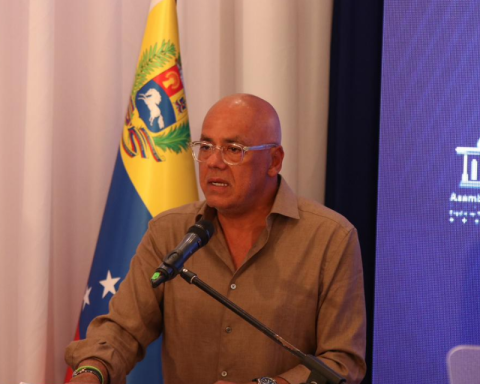Several months ago, perhaps a year ago, the most lapidary will say that Ximena Rincón and Matías Walker run in a very different lane to which President Gabriel Boric and the parties of the ruling party transit. They distanced themselves from the left, affirming that they lived in a center, with a DC heritage. Now, more than a moderate left and reconsidered from the extreme, its political domicile is fixed on the right, after they announced its administrative incorporation to the committee of the Evópoli bench in the Senate. Thus forming, officially, a group opposed to the Government and leaving control of the Upper House to the right.
Rincón pointed out that the letter that was sent to the Senate was to accept the invitation of the Evópoli committee and sign a merely administrative agreement, since both she and Walker, since they did not have a committee, could not have a voice or vote in the administrative decisions of the Upper House. It would be, then, a movement that is in function of “exercising the same rights, and in equal conditions as the rest of the senators and senators.” Rincón tried to make it clear that “we do not change our convictions, this is merely administrative”.
Another of the problems that arose from not having a committee is that they could not hire “expert advisors to deal with certain highly complex bills, such as pensions, for example. Neither use the time of incidents in the Chamber to raise regional issues of relevance, to which only the committees have access”.
In addition, he took the opportunity to thank “To the only bench in the Senate that offered us this possibility, understanding that this helped us resolve administrative issues and nothing else. They did not change our convictions.”
Another controversy that was uncovered with this new alignment was raised by the senator and former candidate for the Presidency, Yasna Provoste. The head of the DC bench demanded that the seats assigned to former militants Ximena Rincón and Matías Walker be returned to the Falangist party. Provoste warned that the agreement that led Juan Antonio Coloma (UDI) to preside over the Senate also compromised a rotation in quota commissions, and these are quotas that belong to party committees. So, since the ex-DC resigned from the party, these commission seats should go back to that party.
The senator who is now registered in the Evópoli committee responded to her former co-religionists: “Provoste and Huenchumilla voted for the Senate table and this implies fulfilling an agreement made. It is illogical for them to respect that part and not respect another. The agreement is one.” In addition, she added that “the commissions are consigned by names and not by committees or benches.”
With this movement, the Senate remains in the hands of the opposition and becomes a stony path for any project of the Executive, since now the right has 27 votes out of 50. The announcement was made just after the rejection of the idea of legislating the tax reform and when the possibility of the Government insisting on the Upper House is being studied.
From the ruling party that is represented in the Senate, Juan Ignacio Latorre, president of the DR, views this inscription with concern: “They say that they are not from the right, that they are from the center and that this incorporation into the Evópoli committee is only administrative. Now, when one makes administrative agreements in the Senate, in my experience, similar spaces are sought from the political point of view. I hope the centrist politics that the Democrats claim to represent doesn’t end up working for the conservative right.”
Ximena Rincón witnessed the rejection of the reform. She was the only senator inside the Chamber at the time. She entered the chamber minutes before the vote to talk with deputies Erika Olivera, Joanna Pérez and deputies Miguel Ángel Calisto and Jorge Saffirio.
Some say that in that conversation the senator would have influenced the vote of her colleagues to reject the reform and, thus, make a point to the Government after not having considered them in a conversation. She was in the middle of the room when the chamber screens revealed that one of the main reforms of the current administration was falling. As if she had come to see the expected end of a movie that she already knew how it would end, sources in Congress maintain.
From the Democrats bench, on the other hand, they warn that the decision was made days ago and that their decision is based on the fact that the Government did not listen to the apprehensions of the opposition in an active way. The fact that the senator was in the room that day was because she coincided with a press item that she would deliver later along with Pérez and Olivera on the Women’s agenda, which was actually carried out.
With the secondment to the Evópoli bench in the Senate, Rincón gives a twist to his political history and his partisan heritage. she was minister of Labor and Social Welfare and Minister Secretary General of the Presidency during the second term of Michelle Bachelet, with whom she shared a very different political address from today.
The clearest differences began to be glimpsed with the previous constituent process, in which the former President and her former minister were seen in different paths. Bachelet, on the one hand, pushed for approval as United Nations High Commissioner for Human Rights, when she quoted Pablo Milanés to refer to the now-rejected proposal: “It is not perfect, but it is close to what has always been I dreamed”.
Rincón, on the other hand, was much more proactive in the debate on the new Constitution, together with Cristián Warnken, and even introduced a reform that was later approved and that, in some way, changed the balance regarding what it meant to vote for an option or another in the plebiscite.
The project sought to reduce the constitutional reform quorum to 4/7 in exchange for the famous 2/3 lock. That is to say, one of the cornerstones of the constituent debate and one of the fundamental reasons for the little progress in social rights throughout the Concertación governments.
With this reform approved, the Rejection option could promise constitutional reforms with greater possibilities and thus drain water from the pool of Approval. As the senator warned, the project entered it to demonstrate its intentions and confirm that the interest of its political sector was intended to “convey to the public that we are committed to a Constitution in which all actors participate. We want it to be really everyone’s home ”, not like – in her opinion – the proposal for a new Constitution that was finally rejected on September 4.
In that campaign process of I Approve and I Reject, in a television program in a debate format between representatives of each option, the president of the PS, Paulina Vodanovic, who was for the Approve, predicted the political domicile that today seems to host Rincón. The senator, at that time DC, said in reference to the proposal for a new Magna Carta: “Let’s discuss again, let’s do it well because the public will reject it.” Vodanovic retorted: “Let’s do it right, until the right likes it. I do not agree”. Rincón responded: “I am not from the right, Paulina. Why do you insist on putting me in that group?
Rincon already has a history. She was mayor of the Santiago Metropolitan Region between 2005 and 2006. As soon as she finished her work in the mayor’s office, she was appointed as director of AFP Provida with a salary of $60,000,000 a year, which she received until the last month, just before that March. when she became a senator for Maule Sur.
When he was already occupying a seat in the Upper House, he was one of the voices that proposed a different pension system: “We have come to propose a reform that allows Chileans to have alternatives in pension matters, being able to opt for an individually funded system or by a pay-as-you-go.” Years later, as Labor Minister, she was one of the harshest voices against the AFP system.
The issue of pensions did not end there. In 2020, in the midst of the discussion for the second withdrawal of 10% of the AFP funds in the Senate Constitution Commission, an intervention by Rincón caused the annoyance of his peers. It is that the parliamentarian presented an indication that directly benefited Felices y Forrados, a company that was dedicated to delivering recommendations regarding the exchange of pension funds for a monthly payment. This is how she said the indication: “The pension advice, whether free or paid, may not be restricted for the purposes of the retirement of pension funds that the transitory provisions of this Constitution establish, or for other pension purposes that the affiliate determines.”
Eight days later, the CEO of the consultancy, Gino Lorenzini, admitted his working relationship with Ricardo Rincón, brother of the senator. This link was not made transparent in the Work Commission. In addition, there were emails that would have linked the brothers with the consultant and even audios in which Lorenzini talks about the movements that “Ximena” must make in Parliament. On that occasion, Rincón denied the private link with the company.
Now, with government reforms in full legislative process, and with the quotas for Senate commissions to see, it will be possible to see how far to the center Senator Rincón is and how aligned her opposition is with that of her new benchmates. In short, how administrative is this change.


















